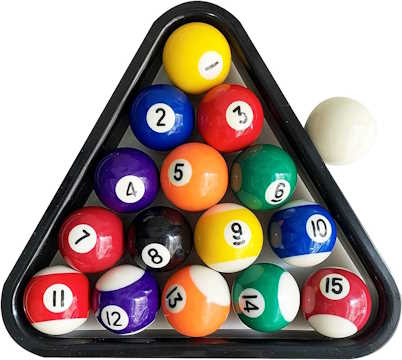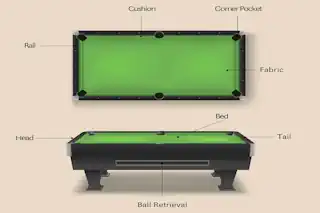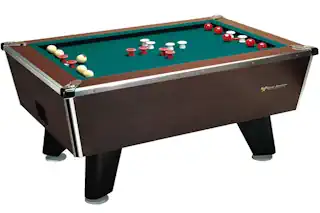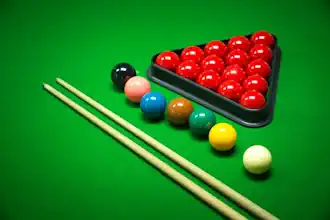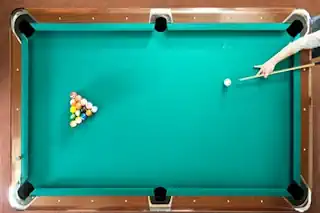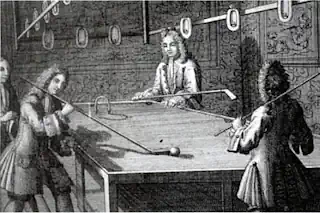Pool Table vs Billiard Table: What’s the Difference?
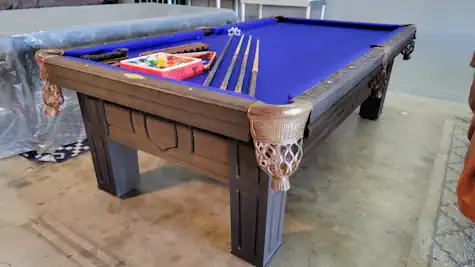
Hey there, fellow cue sports lovers! If you’re on the hunt for the perfect table to add to your game room, you might be wondering: what’s the difference between a pool table and a billiard table? While these two terms are often used interchangeably, there are some key distinctions that set them apart. Let’s dive in and explore the world of pool and billiards together!
A Brief History Lesson
To really understand the differences between a pool table and a billiards table, it helps to know a bit about their origins. Billiards, the older of the two games, dates back to 15th century Europe. It was originally an outdoor game played on the ground, but eventually moved indoors and onto a table. Over time, the game evolved and new variations emerged, including snooker and carom billiards.
Pool, on the other hand, is a more recent invention. It developed in the United States in the 19th century as a simplified version of billiards. The name “pool” actually comes from the betting pools that were common in bars and taverns where the game was played.
Table Talk: Design and Dimensions
One of the most noticeable differences between a pool table and a billiards table is their size. A standard pool table measures 9 feet long and 4.5 feet wide, while a regulation billiard table is slightly larger at 10 feet long and 5 feet wide. This extra size gives a billiard table a bit more playing surface, which can affect the games played.
Pool Table Sizes to Consider
When it comes to finding the perfect pool table for your space, it’s important to know that they come in a variety of sizes. Here’s a breakdown of the most common pool table dimensions you’ll encounter:
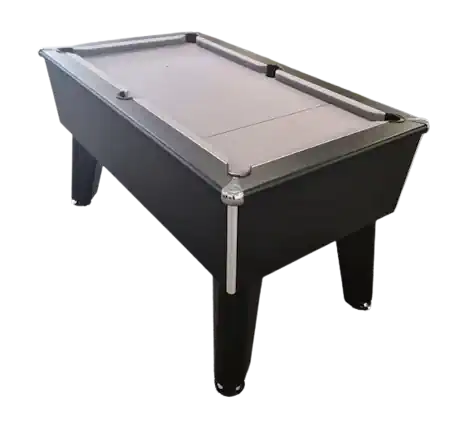
Seven-foot table: Often found in bars and casual game rooms, these are sometimes called “bar boxes or bar table.” They’re great for tighter spaces and offer a fast-paced game.
Eight-foot table: These are a common choice for home game rooms. They strike a nice balance between playability and size, making them perfect for the home or recreational table for both casual and serious players.
Eight and a Half foot table: A bit rarer, these tables offer a bit more challenge than the 8-foot version, bringing you closer to the professional game experience without taking up as much room as a 9-foot table.
Nine-foot table: The choice of tournament players and serious enthusiasts. This is the regulation-size tournament table for professional competitions, providing the largest playing surface and the greatest challenge.
Choosing the right pool table size depends on your available space, your skill level, and how you plan to enjoy the game. Always measure your room first and remember to leave enough space around the table for players to comfortably take their shots!
Billiard Table Sizes to Explore
When you’re looking to bring a billiard table into your home or community space, it’s just as important to consider the different sizes available as it is with pool tables. Here’s a quick guide to help you understand your options:
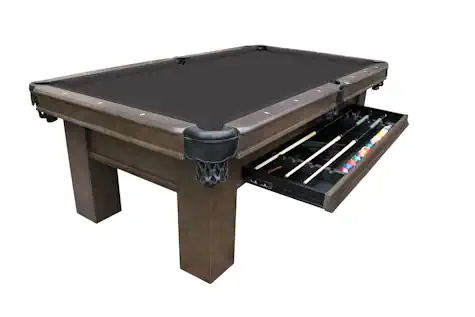
10-foot tables: Known as regulation size in the billiard world, these tables are the standard for serious players and is considered the pro or tournament table. They provide ample space for strategic play and precision.
9-foot tables: A bit more compact, these tables can offer a challenging game and fit more comfortably in residential spaces. They’re a popular choice for those who have a bit of room to spare but can’t accommodate a full-size table.
Snooker tables: Although snooker is a different game, a snooker table is often included in discussions about billiards. They measure 12 feet by 6 feet and have smaller pockets, offering a unique challenge. They are a larger table than all of the others. People who play snooker learn to adjust angles to compensate for the size of the larger table.
Choosing the right size for your billiard table involves considering the space you have available and your aspirations for the game. Whether you’re hosting friendly matches or honing your skills for competition, there’s a table size that’s just right for you. Remember, the goal is to enjoy the game, so pick a size that maximizes your pleasure and fits your space.
Materials and Construction
The materials and construction of the tables also differ. Pool tables typically have a slate bed covered in felt, with six pockets (four at the corners and two at the midpoints of the long sides). Billiard tables, on the other hand, may not have pockets at all! They’re usually made of wood with a tightly stretched cloth covering, and the surface is often heated to keep the balls rolling smoothly.
Average Costs for Different Sizes
When you’re in the market for a new game table, understanding the potential investment is key. Here’s a friendly rundown of what you might expect to spend on different sizes of pool and billiards tables. Remember, these are average costs, and prices can vary based on brand, materials, and other factors. But, this should give you a good starting point!
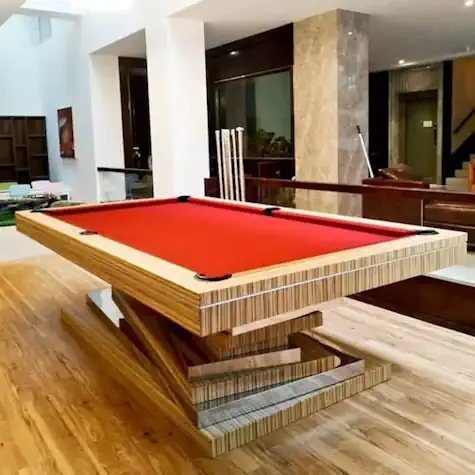
Pool Tables:
Seven-foot tables: On average, you might spend anywhere from $1,200 to $3,500. These compact tables are perfect for casual play and smaller spaces.
Eight-foot tables: These tables typically range from $1,500 to $4,000. They offer a great balance of playability and affordability for most home game rooms.
8.5-foot tables: Expect to invest about $2,000 to $4,500 for these slightly larger tables, offering a closer-to-professional experience without overwhelming your space.
Nine-foot tables: For the regulation-size enthusiast, prices range from $2,200 to over $5,000. These are the top choices for serious players and those looking to replicate a tournament-level experience.
Billiards Table:
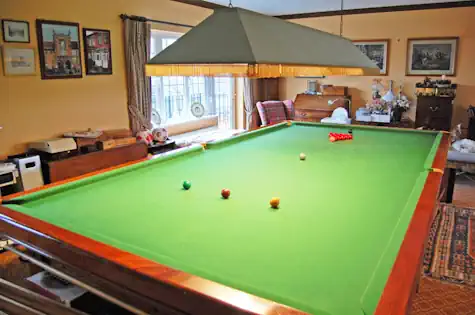
Ten-foot table: Being the standard for serious billiard players, these tables can set you back around $2,500 to $7,000, depending on the craftsmanship and materials.
Nine-foot table: A bit more accessible for tighter spaces, these tables average between $2,000 and $6,000.
Snooker table: While technically different, these tables are often considered in the billiard family and cost between $2,500 and $10,000, especially given their larger size and unique requirements.
Whether you’re setting up a cozy play corner in your home or aiming for a more professional setup, there’s a table that fits your budget and aspirations. No matter what size or style you choose, remember that the joy of the game and the memories you create around these tables are priceless.
Playing by the Rules
Of course, the real heart of the pool vs billiards debate lies in the gameplay. Pool includes several variations, like 8-ball, 9-ball, and straight pool, each with its own specific rules and objectives. In general, though, the goal is to sink your designated balls into the table’s pockets using a cue ball.
Billiards, meanwhile, encompasses its own range of games. In three-cushion billiards, for example, the goal is to carom the cue ball off both object balls and contact the rail cushions at least three times before the last object ball. Snooker, another popular billiards game, is played with 21 colored balls on the larger snooker table and has a complex scoring system.
A World of Possibilities
No matter which game you prefer, there’s no denying that both pool and billiards hold a special place in the hearts of players around the globe. From dimly lit pool halls to posh billiards rooms, these games have a rich history and cultural significance that spans continents.
Fun fact: did you know that billiards was once an Olympic sport? It’s true! Pool made an appearance at the 1904 Games in St. Louis, albeit as a demonstration event. Who knows, maybe we’ll see it on the world stage again someday.
Choosing Your Perfect Table
So, you’re ready to take the plunge and buy a table of your own. How do you choose between a pool table and a billiard table? Ultimately, it comes down to your personal preferences and the type of game you want to play.
Consider the space you have available, as well as your budget. Pool tables are generally less expensive than billiard tables, but the cost can still vary widely depending on size, materials, and craftsmanship.
Think, too, about who will be playing. If you’re looking for a casual game to enjoy with friends and family, a pool table might be the way to go. But if you’re a serious player looking to hone your skills, a billiard table could be a worthwhile investment.
The Bottom Line
At the end of the day, whether you choose a pool table or a billiard table, you’re in for hours of fun and friendly competition. Both games offer a fantastic way to unwind, socialize, and sharpen your strategic thinking skills.
So, dust off that cue stick, rack up the balls, and let the good times roll! With a little practice and a lot of passion, you just might become the next pool or billiards pro. Thanks for joining us on this journey into the wonderful world of cue sports!
Frequently Asked Questions (FAQs)
How much space do I need around my table for comfortable play?
Generally, you need at least 4 to 5 feet of clearance on all sides of the table. This allows players to move and use cues without restrictions. For a 7-foot table, a room size of 17 feet by 13.5 feet is recommended. A snooker table will need up to 22 feet by 16 feet to play properly.
Can pool tables also be used for billiards and vice versa?
While pool tables can be adapted for some forms of billiards, such as straight carom (with some adjustments like inserting plugs into the pockets), standard billiard games requiring a larger playing surface are not ideally played on pool tables. Conversely, playing pool on a traditional billiard table might not provide the best experience due to the lack of pockets.
What’s the best way to maintain my table’s cloth?
To keep your table’s cloth in prime condition, brush it regularly with a table brush to remove chalk and debris. Also, consider using a cover when the table is not in use to protect it from dust and accidental spills.
Do the balls used in pool and billiards differ?
Yes, they do. Pool balls are typically slightly larger and numbered, whereas billiard balls are slightly smaller and are not numbered, given the different nature of the games.
Is it necessary to hire a professional for assembling a pool or billiard table?
While not always necessary, hiring a professional is highly recommended due to the complexity of the assembly and the need for precise leveling. This ensures the best possible playability and longevity for your table. Getting something the size of a snooker table into a basement or upper-floor location can be daunting if you do not have the right equipment.
Are there any beginner-friendly cues to start with?
For beginners, choosing a cue stick that is well-balanced and of standard weight (about 19 ounces) is a good start. Ensure the tip is properly shaped and maintained for better control.
Can I move a pool or billiard table once it’s set up?
Moving a table after setup is not recommended without professional assistance, as this can misalign the slate and require re-leveling. If movement is necessary, consult with a professional service to prevent damage. The additional size of snooker tables can make moving them especially challenging.
